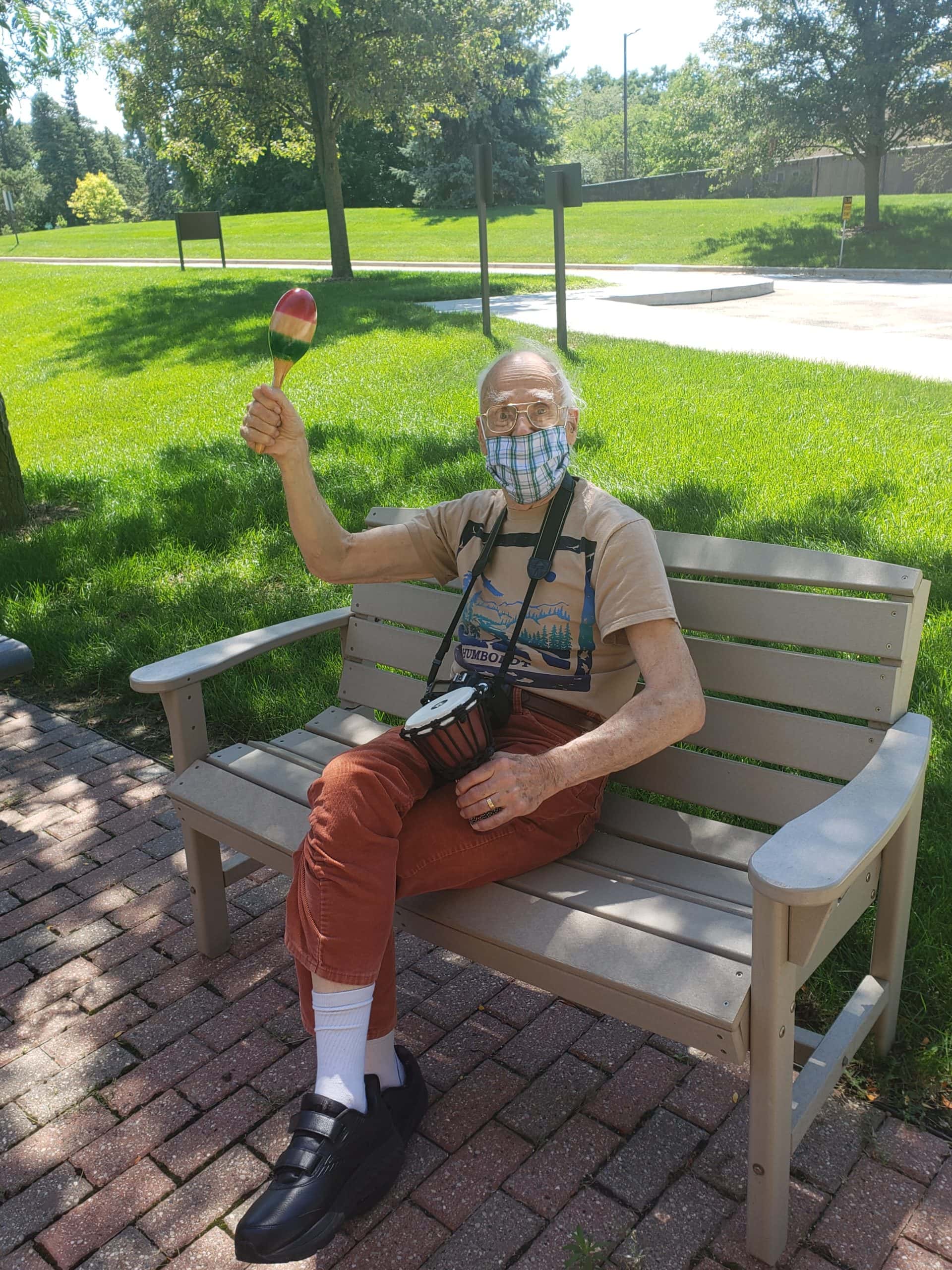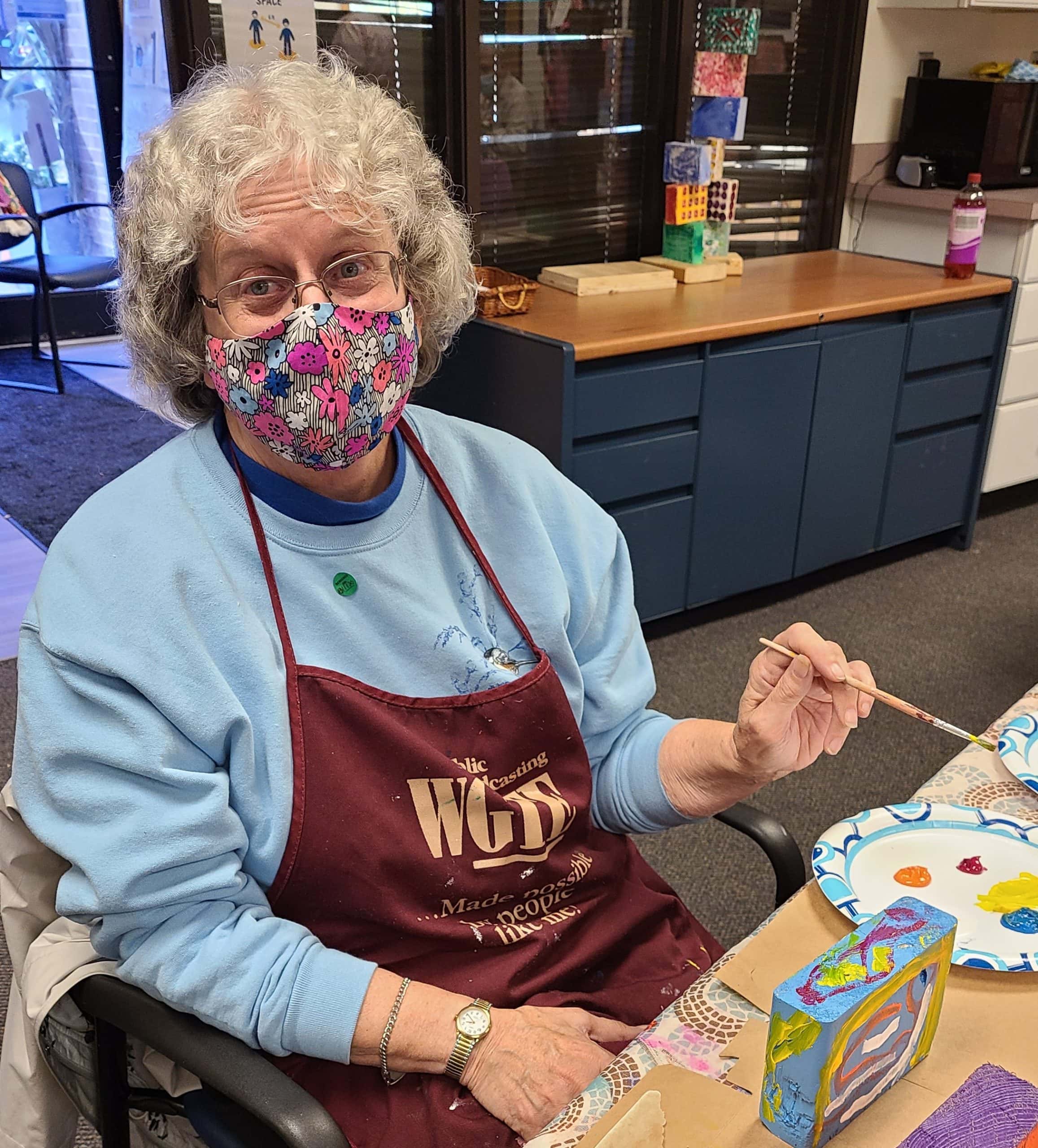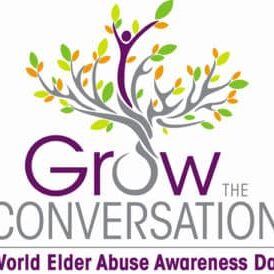We’re going to be closing out National Family Caregivers Month with interviews and information about adult day care programs in Washtenaw County. Recently we spoke with Shannon Etcheverry of Silver Club. A program of Michigan Medicine’s Geriatrics Center, Silver Club offers a respite for caregivers by providing their family member who has dementia with a social outlet and engaging activities in a safe environment.
Ahead of the Curve: If you had to give an “elevator speech” about what your organization does, how would you describe it?
Shannon Etcheverry: Since 1998, Silver Club Memory Programs has provided activities and socialization for individuals with mild to moderate dementia. The Adult Day Enrichment Program provides respite for stressed caregivers while the member enjoys engaging activities (such as art, music, fitness, trivia, games and more) in a warm and supportive environment. The Mild Memory Loss groups (which includes Elderberry -for women, Mindworks, and Chelsea Coffeehouse) focus on cognitive games, discussions, creativity, and comradery. Our motto is “Together, we make every moment matter.”
AOTC: Walk me through the step-by-step process. What happens when you get a phone call/referral?
SE: When a potential member family calls us, they will be connected with Silver Club’s Director or Administrative Assistant to discuss the program and answer questions. Potential members will then be mailed or emailed an intake form, which provides us with information about the individual (we don’t require a referral from a doctor, nor does the member need to be a Michigan Medicine patient). It’s important for us to know the person’s history, former profession, likes, dislikes and hobbies before the first visit so staff can best engage them. Once the intake form is returned (via mail, drop off, fax or email) a free visit will be scheduled. During the 1-hour free visit, the potential member has an opportunity to meet staff/members and engage in an activity, while the caregiver meets with the Director to go over program policies. For potential members of our mild memory loss groups, the facilitator will set up a meeting prior to participating in one of the groups. We offer a sliding scale fee. Silver Club offers a paid trial period in which it can be determined if the member’s participation is a good fit for all involved.
AOTC: What organizations do you work closely with?
SE: Silver Club has numerous cherished partners in the community, Firstly, we are one of the community programs within Michigan Medicine’s Geriatrics Center (along with the Turner Senior Wellness Program and the Osher Lifelong Learning Institute which are both located in the same building as Silver Club- The Turner Senior Resource Center). Big Hearts for Seniors (which hosts a fundraising event yearly) is comprised of Silver Club and four other Michigan Medicine Programs (Ann Arbor Meals on Wheels, Housing Bureau for Seniors, Osher Lifelong Learning Institute, and Turner Senior Wellness Program). We have grants/contracts with the Area Agency on Aging 1-B, the National Brookdale Foundation and the Ann Arbor VA. We work closely with the Michigan Medicine Volunteer Services department, the Retired and Senior Volunteer Department (RSVP), and local schools (University of Michigan, Eastern Michigan University, local high schools) for volunteers, student interns and educational shadowing opportunities.
Several times a year, our members visit the University of Michigan Museum of Art to participate in the ‘Meet me at UMMA’ program where tours are given by docents trained on dementia. The Chelsea Senior Center donates in-kind space for us to facilitate one of our mild memory loss groups (Chelsea Coffeehouse). For transportation we work closely with Jewish Family Services and A-Ride. We collaborate with other groups such as the Alzheimer’s Association and the Michigan Alzheimer’s Disease Center. Silver Club is also a member of the Michigan Adult Day Services Association. We’re very fortunate to have so many connections in the community.
AOTC: What are some things you wish the public knew about your role?
SE: I wish the public knew more about adult day care in general and its important role. It is mutually beneficial for the members and their caregivers. It helps individuals to age in place while remaining under the same roof as their family. Silver Club (and other adult day programs) foster cognitive, social and physical wellness. We also laugh a lot! Given the social isolation that so many have experienced during COVID, we’re more aware than ever the importance of socialization, recreation, and purpose. We take it as a huge compliment when our members share how much fun they’ve had at the end of the day.
AOTC: What tips do you have for someone with a loved one that’s going through this issue/needs assistance?
SE: Given that November is Family Caregivers Month, I would encourage families to be patient and kind with themselves. This journey can often be challenging, and caring for oneself is critically important in having the capacity to take care of others. I often hear families say that they wish they would have known about or participated in Silver Club earlier. Our continuum of care works best when members join our mild memory loss groups and later transition into our Adult Day Program if needed. However, we are always happy to introduce new members into our group! Washtenaw County is fortunate to have a plethora of dementia specific resources and organizations and I highly recommend families connect with those organizations for a source of information and support.
AOTC: Is there anything you would like to add?
SE: In addition to our in person programming, Silver Club also offers virtual programming (Wednesdays 4pm-5pm). One of our valued volunteers sings and plays the piano for a weekly sing along. More information about all of our programs is available on our website and Facebook page!
Thank you to Shannon for sharing information about this valuable community program! Next week on the blog we’ll be speaking with Tina Berry of Huron Valley PACE.
Visit the Ahead of the Curve Resource Directory for information about other caregiver resources in the community.








